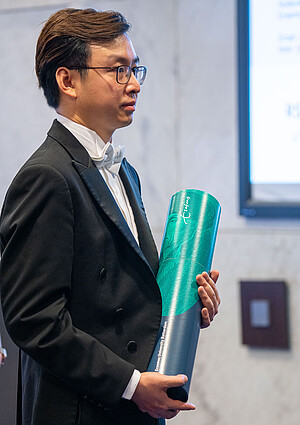PhD Defence Wenjie Liu

In his dissertation, An Indigenous Perspective on Institutions for Sustainable Business in China, ERIM’s Wenjie Liu built endemically Chinese theoretical explanations on how institutions shape businesses' ability to simultaneously contribute to economic expansion, environmental protection, and social equity through three findings. First, he provided insights into how to fit classic Western management theories with Chinese institutional contexts more tightly. Second, he found that collaboration with foreign MNEs, which presents an opportunity structure to these NGOs, is crucial to predict their effectiveness. Yet local governments’ own level of commitment to the natural environment substitutes for the main effect. Finally, he discovered that state political ideology can be used to impose clan-like control on corporations, but its effectiveness depends on the central state’s ability to intervene in local governments. These findings together shaped an integrated framework for understanding institutional arrangements that promote sustainability among Chinese businesses.
Wenjie defended his dissertation in the Senate Hall at Erasmus University Rotterdam (EUR) on Thursday, 15 June 2023. His supervisors were Prof. dr. Pursey Heugens (RSM) and Dr. Frank Wijen (RSM). Other members of the Doctoral Committee were Prof. dr. Christopher Marquis (University of Cambridge), Dr. Brian Campbell Pinkham (RSM), Prof. dr. Xiaowei Rose Luo (INSEAD), Prof. dr. Jonathan Doh (Villanova University), Dr. Yu Liu (RSM), and Prof. dr. Taco Reus (RSM).
About Wenjie Liu

Wenjie Liu was a Ph.D. Candidate in Strategic Management at Rotterdam School of Management, Erasmus University. His research focused on organizational responses to global challenges for sustainability. He used quantitative methods to study how different stakeholders (multinational corporations, non-governmental organizations, governments) shape the sustainability of firms and their actions toward these stakeholders. His research built on different organizational and sociological theories and sought to expand the current understanding of achieving the United Nations’ Sustainable Development Goals in authoritarian contexts. His research has been accepted for publication in the Journal of International Business Studies and the Journal of Management.
Wenjie regularly presents at international conferences, including the Academy of Management, the Academy of International Business, the Alliance for Research on Corporate Sustainability, and the Strategic Management Society. His papers have been included in AOM best paper proceedings and have received finalist positions for the 2021 OMT Best International Paper Award at the Academy of Management and the 2022 Best PhD Student Paper Award at the Group for Research on Organizations and the Natural Environment. Wenjie is also a recipient of the 2022 Kwok Leung Memorial Dissertation Fund grant from the International Association for Chinese Management Research.
Wenjie has held a visiting position as Research Fellow at Columbia Business School. He obtained his Master degree from the South China University of Technology.
Thesis Abstract

This dissertation builds endemically Chinese theoretical explanations on how institutions shape business’ ability to simultaneously contribute to economic expansion, environmental protection, and social equity. The first study, based on a new multivariate application of meta-analysis ensuring the comparability of effects and causal identification of the estimates, explicates the applicability of classic Western management theories in China and provides insights into how to fit these theories with Chinese institutional contexts more tightly. Inspired by meta-analytic results for resource dependence theory, the second study theorizes and tests how Chinese NGOs, which have limited room to maneuver and which are under close surveillance by the Chinese state, can still put sufficient pressure on local supply chains to bring them to more sustainable practices. This study shows that creating collaborative ties with foreign MNEs, which present an opportunity structure to these NGOs, is a crucial element predicting their effectiveness. Yet local governments’ own level of commitment to the natural environment substitutes for the main effect. The third study, which is inspired by meta-analytic results for neo-institutional theory, highlights a soft corporate control mechanism at the disposal of the Chinese government: control by means of exposure of the corporate elite to the prevailing state political ideology. This study finds that state political ideology can be used to impose clan-like control on corporations, but its effectiveness depends on the central state’s ability to intervene local governments. Together these findings contribute to an integrated framework for understanding institutional arrangements that drive sustainable business in China.
View photos of Wenjie's PhD Defence
Photos: Frank van der Panne


